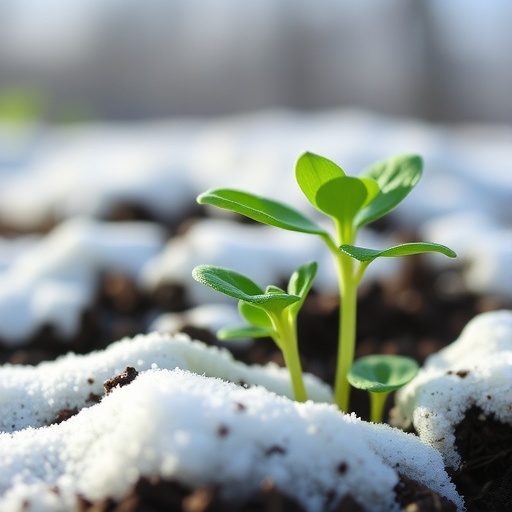In the ever-evolving narrative of climate change, the intricate processes of nitrogen cycling in temperate winter soils demand our attention. A new comprehensive review by Sahoo, Baù, and Thornton shines a critical spotlight on this subject, revealing how climate variations are reshaping foundational ecological processes. With the looming threats of global warming, understanding how nitrogen, an essential nutrient for plants and a key component of various biological systems, interacts with the environment during winter months becomes increasingly important.
At the heart of this discussion lies the role of nitrogen in terrestrial ecosystems. Nitrogen is not only a basic building block of amino acids and proteins but also plays a pivotal role in the production of chlorophyll, which is essential for photosynthesis. Understanding the cycling of nitrogen is crucial for agricultural productivity, ecosystem health, and overall stability in the face of climate variability. The review emphasizes that changes in temperature, precipitation patterns, and snow cover significantly impact nitrogen cycling processes in these temperate regions, particularly during the winter season.
The researchers meticulously outlined the biochemical pathways and microbial processes involved in nitrogen transformation. One notable aspect is the microbially driven ammonification process, in which organic nitrogen is converted to ammonium, followed by nitrification, where ammonium is oxidized to nitrate. This intricate cycling is influenced by soil temperature and moisture, which fluctuate with climate change. The review suggests that warmer winters can lead to earlier soil thawing and altered microbial activity, amplifying the nitrogen release into the soil and, consequently, the ecosystem.
Amidst the backdrop of rising global temperatures, the review identifies significant implications for nitrogen leaching and runoff. Increased precipitation intensity, another consequence of climate change, may accelerate nitric leaching into waterways, leading to environmental issues such as eutrophication. In regions where snow is a critical winter feature, changes in snowpack dynamics can alter the soil moisture regime, affecting nitrogen retention and its circulation through the ecosystem. The associated risks to water quality and aquatic life call for urgent consideration and management of nitrogen inputs.
Moreover, elevated carbon dioxide levels can further influence nitrogen cycling dynamics. The review discusses how enhanced CO2 may lead to increased plant growth, but also highlights the potential for greater nitrogen demand that may not be met due to ongoing climate alterations. This concept of nitrogen limitation presents a paradox where vegetation might thrive in carbon-rich environments yet struggle for nitrogen, leading to imbalances in nutrient availability and overall ecosystem functionality.
The authors also delve into the complexities of soil microbial communities under shifting climatic conditions. They note that diverse microbial populations play a crucial role in nitrogen cycling through processes such as denitrification, where nitrate is reduced to nitrogen gas, thus integrating nitrogen back into the atmospheric cycle. However, changes in temperature and moisture can shift microbial community dynamics, potentially leading to unforeseen consequences for nitrogen dynamics. A loss of microbial diversity may diminish the resilience of nitrogen cycling processes, necessitating more robust research into these communities under climate stressors.
The findings of this review prompt important questions about agricultural practices and land management strategies in the face of climate change. The authors advocate the need for adaptive strategies that consider altered nitrogen cycling patterns during winter months. Such strategies could involve adjusting fertilizer application rates, exploring cover crops with better nutrient retention capabilities, and implementing practices that enhance soil health to bolster natural nitrogen cycling processes.
In the context of global food security, the review stands as a clarion call for integrative approaches that marry agricultural needs with ecological integrity. It emphasizes the significance of a holistic understanding of nitrogen cycling, particularly under the lens of changing winter climates, to inform sustainable agricultural practices that do not exacerbate environmental problems.
There is a prevailing need for interdisciplinary collaboration among climatologists, agronomists, soil scientists, and policymakers. The research acknowledges that bridging scientific knowledge with effective policy frameworks can illuminate pathways towards sustainable nitrogen management. Continued investigation into the intricate relationships between climate variables and nitrogen cycling is essential to predict future dynamics and enhance resilience in temperate ecosystems.
In conclusion, the review by Sahoo, Baù, and Thornton illustrates the pressing need for comprehensive, interdisciplinary research into nitrogen cycling under climate change conditions. As winter climates continue to evolve, so too must our understanding and management of nitrogen within these systems. The enhanced perspectives on the subject not only contribute to academic discourse but potentially pave the way for greater environmental stewardship, ensuring that ecosystems flourish in an era of climate uncertainty.
The complexities of nitrogen cycling during winter months in temperate regions present both challenges and opportunities. The insights gleaned from this review underscore an actionable knowledge base that can empower stakeholders to strategically confront the impacts of climate change while promoting ecological balance. As the dialogue surrounding climate adaptation continues, the role of nitrogen cycling will undoubtedly remain at the forefront of environmental science and policy debates.
Subject of Research: Nitrogen cycling in temperate winter soil under climate change.
Article Title: Review of nitrogen cycling in temperate winter soil under climate change.
Article References:
Sahoo, M., Baù, D. & Thornton, S.F. Review of nitrogen cycling in temperate winter soil under climate change.
Environ Sci Pollut Res (2025). https://doi.org/10.1007/s11356-025-36932-0
Image Credits: AI Generated
DOI:
Keywords: Nitrogen cycling, climate change, winter soils, temperate ecosystems, microbial processes, agricultural practices.




